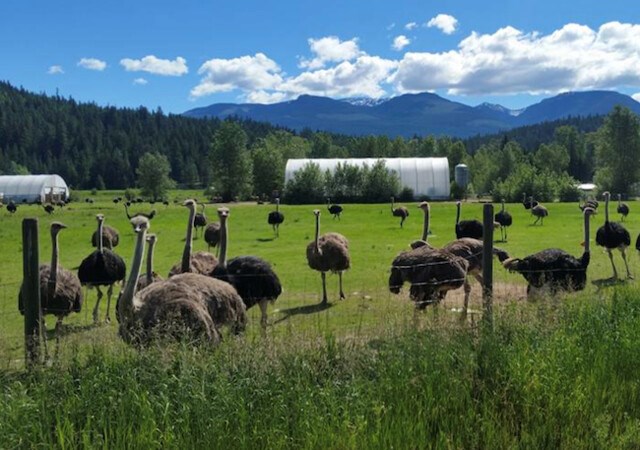The biggest birds on the planet could be the key to ending the coronavirus, including the Delta variant, which is causing much concern.
And a B.C. ostrich farm is on the cutting edge of making that happen.
Universal Ostrich Farm in Edgewood gained public attention when the owners refused to evacuate in the face of the Michaud Creek wildfire last month.
Not only did they stay, but the farm became a refuge for numerous other livestock that people dropped off as they left the area.
The farm is no longer in danger and now Karen Espersen and Dave Bilinski can go back to working on saving the world from a nasty little virus.
It turns out ostriches have a strong immune system and when exposed to COVID-19 they quickly create antibodies.
“Working with a lab back east, we inoculated our hens with the dead COVID-19 virus. The hen produces antibodies in two weeks and two weeks after that she puts them into her eggs,” says Espersen, adding that is one of the reasons they were so hesitant to abandon their 500 birds.
“This is a very natural process and last year we were able to block 99.9 per cent of the coronavirus if it was infused in a face mask.”
For various reasons, the face mask was never mass produced, but a different company began testing and they discovered the birds could be the key to neutralizing COVID-19 completely.
“We were so excited about being able to help the world we dedicated all of our laying hens on the farm to this program,” says Espersen, adding ostriches can produce an egg every two days for several months in a row.
“We inoculated all of our hens and this summer they have been producing antibodies that can neutralize the COVID-19 virus.”
Bilinski says the antibodies are extracted from the egg yolks, with a single ostrich egg being equivalent to 24 chicken eggs.
“This last week, we got word from the lab the antibodies are neutralizing the Delta (variant),” says Bilinski.
Espersen says they are now taking the next step and are working with a company out of Vancouver to create a nasal spray that could be administered to anyone with COVID.
“Maybe it can be something everyone can hold in their pocket, or keep in their medicine cabinet and if they got the coronavirus, they would be able to take this,” she says.
“This is going to be a game changer,” adds Bilinski.
In a report published last year by a company called Biospace, Dr. Yasuhiro Tsukamoto, dean of the graduate school of life and environmental sciences at Kyoto Prefectural University and co-CEO of Ostrich Pharma USA, said: “We have produced ostrich antibodies to many viruses, bacteria, and allergens, but we were pleased to see how quickly the ostriches developed immunity and placed the anti-SARS-CoV-2 antibodies in their eggs. We were even more pleased to see how capable the antibodies were in blocking the virus that causes COVID-19.”
Ten ostriches were vaccinated, and the antibodies from their eggs have already been used in masks, nasal drops and candies in Japan.
The Rinku Medical Clinic, a cancer hospital in Osaka, Japan, has begun a clinical trial on the use of ostrich antibody nasal drops to prevent hospital-acquired coronavirus infection. If a patient infected with SARS-CoV-2 is present, a doctor will spray the antibody solution into the nasal cavity of hospitalized patients, close contacts, and health-care professionals.



